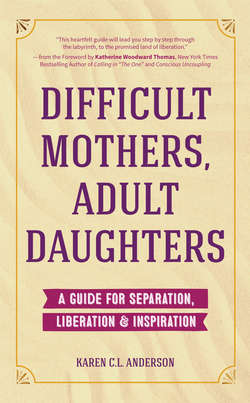Читать книгу Difficult Mothers, Adult Daughters - Karen C.L. Anderson - Страница 14
На сайте Литреса книга снята с продажи.
ОглавлениеChapter 6 “So, Tell Me about Your Relationship with Your Mother.”
Classic, right? It’s what every therapist I’ve ever seen, traditional or alternative, has (eventually) asked when I sought help for various issues (from weight loss to anxiety).
And then there are all the books I’ve read. Books about toxic families and “bad” mothers.
While I found great comfort in telling my story to therapists, and in realizing that I am not alone when I read those books, none of this insight or experience did anything to bring me true and lasting freedom and peace. And that’s not the therapists’ or books’ fault.
While identifying and understanding our mothers’ issues is helpful in being able to provide context for pathology, it doesn’t always give us a path forward. It can actually limit our growth and potential.
It can be a relief to have an explanation, but it can also validate us in feeling angry, sad, bitter, disappointed, and reactive. On one hand, it felt good—exhilarating even—to tell negative stories about my mother in the various online “support” groups I discovered, and to read other women’s similar stories.
On the other hand, those groups seemingly supported me in staying a lesser version of my self, which, ironically, is often what happens between mothers and daughters. So many women share that it’s only when they’re struggling that their mothers seem to pay attention, and when they’re thriving, their mothers display a range of behaviors—everything from ignoring them to lashing out at them.
I experienced something similar and then went deeper into an unhealthy “blame” mode because I believed it shouldn’t be this way.
